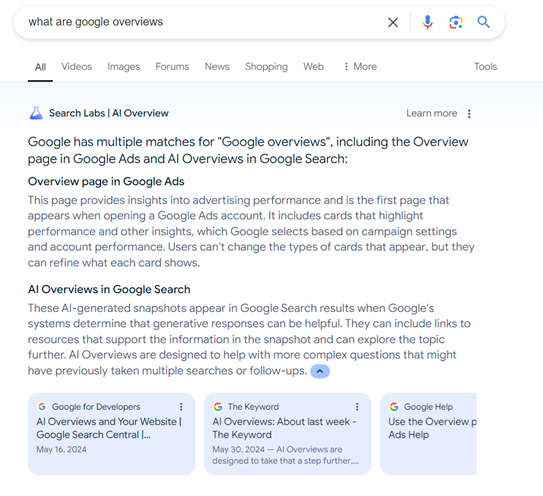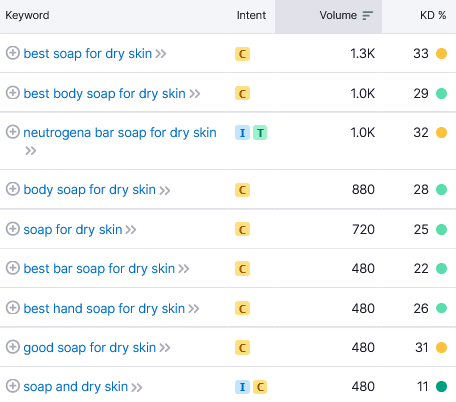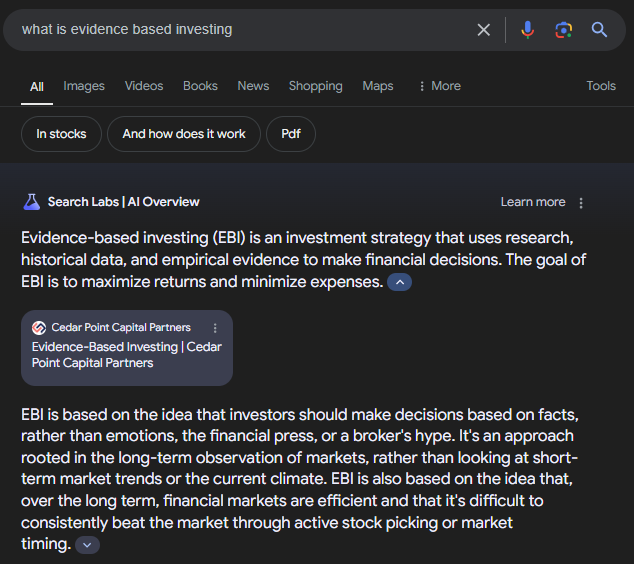When Google officially launched its AI Overview feature in May 2024, those of us in the content marketing and SEO spaces knew it signaled a true changing of the game.
For decades, the focus was churning out keyword-dense blogs and webpages, fighting it out for a first page ranking and hoping that people clicked, thus entering your marketing funnel.
That worked for a long time, until Google decided it would rather be your personal assistant than your personal librarian. Now, armed with its advanced Gemini AI model, the search giant can answer many questions quickly and accurately (for the most part).
So where does that leave your brand and all of that carefully crafted SEO strategy and content?
The truth is, content marketing still matters to your digital marketing efforts—you just need to understand what your customers really want before you get started.

Understanding Intent & the Needs of Search
The key to mastering this new age of generative search lies in understanding search intent.
For many years, the emphasis has been put on choosing the “right” keywords, including:
- Those that align with the words your customers are using to search
- Those that capture niche phrases, described as "long tail"
- Those that can be worked into copy naturally
Keywords are great and important, of course, but it’s only part of the search equation these days. You must also understand the intent of searchers and why they might want or need your content in the first place.
That’s why the keyword research we produce here at Informatics includes intent metrics. These give us a better idea of what a web searcher using a specific term might actually want to accomplish. Those keywords are sorted into four main categories:
Commerical: When a user is doing research for a purchase decision.
Informational: When a user is seeking information or answers to a question.
Navigational: When users are seeking a specific page or destination.
Transactional: When a user wants to complete a specific action or buy a specific product or service.
(You can see the specific search intent identified with a keyword in the second column of this table, generated by SEMRush.)

These search intent categories are top-of-mind when we’re planning and executing new content. We ask our clients questions such as:
- Is this a fast search where they just want the answer from an authoritative source?
- Are they investigating deeper on a topic, looking for niche or nuanced information?
- Are they looking for an expert source that they can engage with or possibly even hire to help them solve a problem?
Understanding why your customers are searching will help us craft better content that meets their needs, AI Overview or not.

Strategic Content Creation in the Age of AI Overviews
Before AI Overviews, your brand was the authority. For years, all Google could do was collect and curate a list of webpages that it felt answered the user’s query—but users still had to click through and read the answer for themselves.
Now, with AI Overviews, Google is taking over that role of authority by summarizing multiple leading webpages. With all this information readily presented, users will likely be less inclined to click into a site (although your company will still benefit from the brand awareness of being listed at the top of a Google search page.)
Of course, the information and expertise your company offers customers is deeper than just one AI overview—it’s also what enables you to build trust and loyalty over the long term. You don’t want to give up on your content marketing strategy just because Google may be repurposing your info—you need a strategy to capitalize on the change.
As we have been advising clients, you now essentially have three paths to follow—all of which should be used as part of a holistic content marketing strategy:
1. Create clear, authoritative and accurate content
The goal of this is to be elevated into Google’s AI overviews.
Target your audience’s informational or commercial questions by creating content that adds an authoritative perspective to a quick answer. You can do so in several ways:
- By adding quotes: Include and cite quotes directly from experts on your team. Even better, include the expert's brief background or link to their bio page on your site.
- By offering quantitative data: Support your claims with data you’ve collected from studies, surveys, analysis, or other types of primary research.
- By simplifying jargon: Show you can speak to your target audience using their specialized terminology, but also write clearly for a more generalized audience. We recommend answering the question in simplified terms first, including definitions of jargony terms, then build to those more complex concepts.
We’re working on targeting these queries for our clients here at Informatics, and are already having success with the above techniques.
For example, we created a blog on evidence-based investing for our financial services client Cedar Point Capital Partners that is now part of Google’s AI overview on the topic (see image).
For our medical clients, such as Hospitality Dental or FPA Women’s Health, we’re adding first-hand expertise to questions like “How can I prevent breast cancer?”

2. Create more complex, longer-form content
Develop pages that speak to the needs of your customers and their informational searches.
This is high-quality information that is not easily summarized into an AI Overview, or that goes beyond the scope of what can be provided there. Potential clients searching for this level of insight look deeper than AI Overviews in favor of more comprehensive content like pillar pages.
Need an example? Check out our own pillar page on SEO.
3. Create high-quality gated content
Gated content is specifically closed to Google, meant for exclusive use on your website and in your marketing funnel.
This could be whitepapers like our own SEO Secrets whitepaper, exclusive training videos, or industry-focused resources. Use these assets to drive conversions and build loyalty, by demonstrating your value as a partner.
While studies are showing that AI Overviews will reduce Google traffic to publishing websites (a trend we’re also seeing in some of our own client data), the traffic that does arrive will be much more motivated and engaged. Your new metrics need to be focused on engagement and conversions, not traffic or visits. Doing that will give you a better picture of your content’s actual effectiveness, and help you chart a successful path forward in this new era of digital marketing.
Need a better AI content strategy?
Our Digital Marketing experts can help you chart the way forward.

